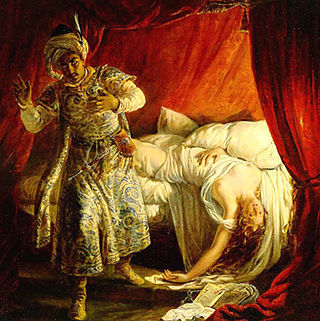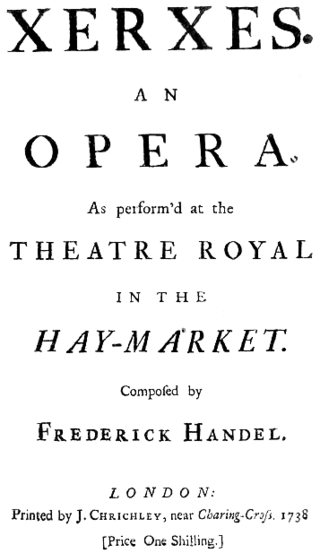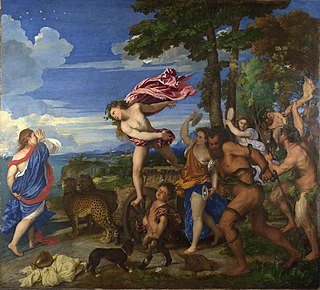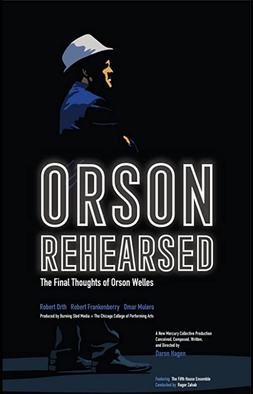
Götterdämmerung, WWV 86D, is the last in Richard Wagner's cycle of four epic music dramas titled Der Ring des Nibelungen. It received its premiere at the Bayreuth Festspielhaus on 17 August 1876, as part of the first complete performance of the whole work.

Otello is an opera in four acts by Giuseppe Verdi to an Italian libretto by Arrigo Boito, based on Shakespeare's play Othello. It was Verdi's penultimate opera, first performed at the Teatro alla Scala, Milan, on 5 February 1887.

Paul Muldoon is an Irish poet.

Serse is an opera seria in three acts by George Frideric Handel. It was first performed in London on 15 April 1738. The Italian libretto was adapted by an unknown hand from that by Silvio Stampiglia (1664–1725) for an earlier opera of the same name by Giovanni Bononcini in 1694. Stampiglia's libretto was itself based on one by Nicolò Minato (ca.1627–1698) that was set by Francesco Cavalli in 1654. The opera is set in Persia about 470 BC and is very loosely based upon Xerxes I of Persia. Serse, originally sung by a mezzo-soprano castrato, is now usually performed by a female mezzo-soprano or countertenor.

Otello is an opera in three acts by Gioachino Rossini to an Italian libretto by Francesco Berio di Salsa after William Shakespeare's play Othello, or The Moor of Venice; it was premiered in Naples, Teatro del Fondo, 4 December 1816.

Daron Aric Hagen is an American composer, writer, and filmmaker.

Shining Brow is an English language opera by the American composer Daron Hagen, first performed by the Madison Opera in Madison, Wisconsin, April 21, 1993. The libretto is by Paul Muldoon, and is based on a treatment co-written with the composer. The story concerns events in the life of architect Frank Lloyd Wright. Hagen invited Muldoon to write the libretto while the two were both in residency at the MacDowell Colony, in Peterborough, New Hampshire during the summer of 1989.

The End of the Affair is a chamber opera with music by Jake Heggie and a libretto by Heggie, Heather McDonald and Leonard Foglia.

L'Arianna is the lost second opera by Italian composer Claudio Monteverdi. One of the earliest operas in general, it was composed in 1607–1608 and first performed on 28 May 1608, as part of the musical festivities for a royal wedding at the court of Duke Vincenzo Gonzaga in Mantua. All the music is lost apart from the extended recitative known as "Lamento d'Arianna". The libretto, which survives complete, was written in eight scenes by Ottavio Rinuccini, who used Ovid's Heroides and other classical sources to relate the story of Ariadne's abandonment by Theseus on the island of Naxos and her subsequent elevation as bride to the god Bacchus.

Amelia is an opera in two acts by Daron Hagen to a libretto in English by Gardner McFall based on a story by Stephen Wadsworth. It had its world premiere at the Seattle Opera on May 8, 2010.

Vera of Las Vegas is an opera by Daron Hagen with a libretto by Paul Muldoon based on a treatment co-written with the composer. It is Hagen's second opera, after Shining Brow. The Center for Contemporary Opera gave the staged premiere on 25 June 2003 at the Leonard Nimoy Thalia Theatre of Symphony Space in New York City.
Mark A. Thomsen is an American operatic tenor. He is also a professor and artist in residence at Florida Southern College. His performance repertoire includes the history of opera, from Cavalli, Bach, and Mozart, to Puccini, Verdi, and Richard Strauss, and the premieres of operas by composers such as Dominick Argento, Leonard Bernstein, Carlisle Floyd and Lowell Liebermann.

The Italian composer Claudio Monteverdi (1567–1643), in addition to a large output of church music and madrigals, wrote prolifically for the stage. His theatrical works were written between 1604 and 1643 and included operas, of which three—L'Orfeo (1607), Il ritorno d'Ulisse in patria (1640) and L'incoronazione di Poppea (1643)—have survived with their music and librettos intact. In the case of the other seven operas, the music has disappeared almost entirely, although some of the librettos exist. The loss of these works, written during a critical period of early opera history, has been much regretted by commentators and musicologists.

New York Stories is a trilogy of English-language one-act operas by Daron Hagen, with a libretto by Hagen and Barbara Grecki first performed in its entirety by Kentucky Opera in Louisville, Kentucky, on 30 October 2010.

The Antient Concert is a sixty-minute-long English language opera in one act by Daron Hagen with a libretto by Paul Muldoon. Hagen describes it as a "dramatic recital for four singers".

A Woman in Morocco is an English language opera in two acts composed by Daron Hagen and based on an unperformed play by Barbara Grecki. It was premiered by Kentucky Opera in Louisville, Kentucky, June 23, 2015, in a production directed by the composer. The libretto is by Hagen and Grecki, who also co-wrote the treatment. The story, set in Tangier in October 1958, concerns the disappearance of an American investigative journalist named Lizzy Holmes working on an exposé of sex trafficking. The work received a complete workshop staging at the Butler Opera Center of the Sarah and Ernest Butler School of Music at the University of Texas-Austin October 25, 2013.

Don Chisciotte alle nozze di Gamace, composed by Antonio Salieri, is an Italian-language opera. The libretto presents the opera as in one act, and the musical score includes a mid-point division, both score, and libretto originally denoted the work a divertimento treatrale. The libretto was written by Giovanni Gastone Boccherini, dancer, poet and stage manager, brother of the composer Luigi Boccherini. The work is loosely adapted from chapters 19 and 21 of Part II of the novel Don Quixote by Miguel de Cervantes. The work was a hybrid opera buffa and ballet, with choreography by Jean-Georges Noverre.

Orson Rehearsed is a 2021 American independent film by Daron Hagen about Orson Welles which combines elements of opera film, documentary film, and Surrealist cinema. The narrative follows a 2018 staged production of Hagen's eleventh opera integrating extensive pre-shot films and electro-acoustic tracks in which, poised in the bardo between life and death on the night of his demise, Welles takes stock of his life. Directed by Hagen based on his own screenplay and musical score, the film was produced by Burning Sled Media and the Chicago College of Performing Arts. It stars Robert Orth, Robert Frankenberry, and Omar Mulero as Welles, and features the Fifth House Ensemble.











